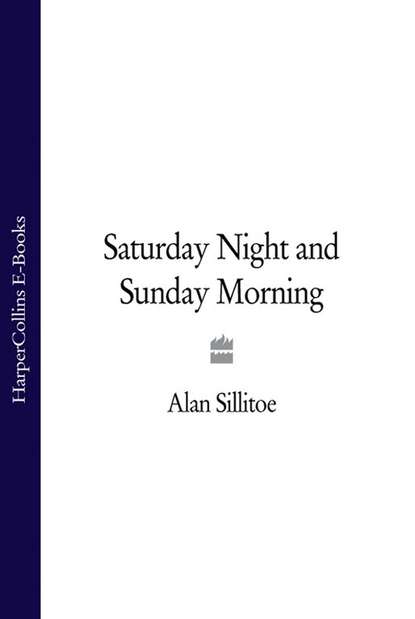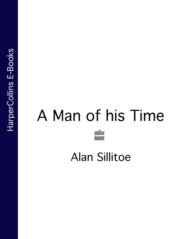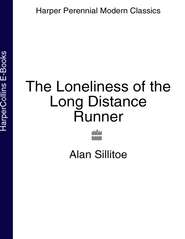По всем вопросам обращайтесь на: info@litportal.ru
(©) 2003-2025.
✖
Saturday Night and Sunday Morning
Настройки чтения
Размер шрифта
Высота строк
Поля
Arthur prided himself on knowing the wood like the back of his hand. There was a lake in the middle where he used to swim when young. A sawmill on the wood’s flank was set like the camp of an invader that ate slowly into it, though a jungle of trees still remained, that could be put to good use by Arthur on such nights as these.
He knew he was hurting her, squeezing her wrist as he led her deeper into the wood, but it did not occur to him to relax his hold. Trees and bushes crowding around in the darkness made him melancholy. One minute he thought he was holding her wrist so tightly because he was in a hurry to find a good dry place; then he felt it was because there was something about her and the whole situation that made him want to hurt her, something to do with the way she was deceiving Jack. Even though he, now leading her to a spot that suddenly came into his mind, would soon be enjoying it, he thought: ‘Women are all the same. If they do it to their husbands they would do it to you if you gave them half the chance.’ He trod on a twig that sent a cracking sound circling the osier-lined indistinct banks of dark water below. Brenda gasped as some bush-leaves swept by her face; he had not bothered to warn her.
The ground was hard and dry. They walked over a hump clear of bushes, the roof of a concealed tunnel burrowed into the earth and strengthened with pit-props, an air-raid shelter for the sawmill men during the war. He now held her hand lightly as she walked behind, considerate and tender again, telling her when to avoid a bush, or a tree-root sticking out of the ground.
There were no more paths in the wood than the clear and definite lines on Arthur’s palms, and he easily found the dry and enclosed place he had in mind. He took off his overcoat and laid it on the ground. ‘We’s’ll be comfortable ‘ere,’ he said softly.
Brenda spoke, the first time since entering the wood: ‘Won’t you be cold?’
Hearing her so solicitous, he could hardly wait for what was to come. He laughed out loud. ‘No fear. This is nothing to what we had to put up with in the army. And I hadn’t got you with me then to keep me warm, duck!’
She put her arms around him, and allowed him to unbutton her coat. He smelled again the smell of a woman whose excitement at doing something she considered not quite right was but one step from the hasty abandonment of making love. He felt the hardness of the imitation pearl brooch against her blouse, and then the buttons themselves, and they lay down on the spot where he had carefully placed his overcoat. They forgot the cold soil and towering trees, and lost themselves in a warm passion in the comfortable silence of a wood at night, that smelled of primeval vegetation, a wood wherein no one could discover your secrets, or kill the delight that a man and a woman generate between them on an overcoat in the darkness.
Back on the lane it needed a few hundred yards to reach the club-house, through a tunnel of bent-over trees with the lights of paradise at the other end. Brenda took his arm, and they joked, talked, smoked cigarettes, felt lovable and agreeable towards each other, as though a great deal of care had been lifted from them.
But Arthur’s gaiety lapsed by the tennis courts, and both became sad, as if they had taken on a happiness that could not be sustained. Brenda walked with head slightly bent, starting when she stepped on a patch of ice. Arthur thought again about Jack, this time with a feeling of irritation that he should be so weak as to allow his wife to go off with other men. It was funny how often you felt guilty at taking weak men’s wives: with the strong men’s you have too much to fear, he reasoned.
Did Jack know? he wondered. Of course he did. Of course he did not. Yet if he doesn’t know by now he will never know. He must know: no man is that batchy. He must have been told. Arthur had no positive reason for thinking that he knew, yet relied on the accuracy of his total ‘weighings-up’ from meetings with Jack and the reports of Brenda. But you could never be sure. Not that it would matter either way, as long as Jack didn’t object to it. There wasn’t much he could do about it: he would never make a divorce. It would cost too much, one way or another. And no woman is worth making a divorce over.
He felt that Jack might be trying to find out for sure what was going on, and that perhaps he might already be at the club waiting for Brenda to arrive. The idea grew stronger, surfaced like a definite warning to his lips. Near the last turn of the hedge he said: ‘Look, duck, I’m just going on in front to see if Jack’s at the club. He won’t be there, I suppose, but I’m going to make sure, so wait for me. I won’t be long.’
She did not argue, but stayed behind, smoking a cigarette he had lit for her. He walked along the gravel drive and in through the gates. He stood by the bottom step, tall enough to look in the windows, trying to see as far as the bar, glad at his good luck that he could see everybody inside, while they could not see him standing there in the darkness. Jack sat by the far window — looking straight at him, as a matter of fact — alone at a table, his hand resting by a half-finished pint. Arthur watched him, feeling a sudden deep interest that would not let him move. He saw a man walk up to Jack, pat him on the back, say something to him in true matey style, and walk away again. Jack shrugged his shoulders, and picked up the glass in a desultory fashion to finish his pint.
So the bastard had really come at last! Arthur was unable to move. Surprise and curiosity fastened him to the hard soil, his eyes a camera that slowly fitted the picture into his brain. Then he remembered Brenda waiting for him down the lane, and with a sudden movement turned and walked away, feeling sprightly and happy as his blood raced once more and his shoes crunched on the gravel, as if he were just coming away from a long and satisfying pint.
He found her where he had left her, standing like a shadow among the other shadows of the hedge. He would not have seen her in fact had she not moved slightly to indicate that she was there. He was so happy he would have walked right back to the main road without knowing what he was doing. He turned towards the hedge in a half-circle, as though he was a vehicle being steered by another person.
‘I was freezing,’ she said, half morosely, half regretfully, as though she had been blaming him for it and was now sorry. He told her to start walking with him along the lane, back towards the bus stop. ‘Why?’ she wanted to know.
‘Because Jack’s in the club.’
She didn’t seem surprised. ‘Did he see you?’
‘Not me,’ he said. She asked what they would do now. ‘You’re going home,’ he said firmly. ‘It’s the best thing to do. I’ll put you on the bus, then go back myself to the club for a drink or two, just to show my face.’
‘What if Jack asks where I went tonight?’
‘Say you went to your sister’s for an hour, that you had a headache and didn’t feel like going to the club.’
It was simple and explicit, because he had not thought about it. If he gave things too much thought they did not turn out so well. She understood, and they kissed good night near the end of the lane. She was warm again after the quick walk from the club. ‘I’m sorry it went wrong,’ he said at the bus stop, ‘but I’ll see you tomorrer night, duck.’
‘That’s all right. We had our bit of love, though, didn’t we?’
‘We did,’ he whispered. ‘I love you, Brenda.’
The bus came, stopped, sped away down the dark road, and he watched until its rearlight turned a corner.
He walked back up the lane, alone, with a tremendous feeling of elation and freedom, hardly able to believe it belonged to him, wanting to dance between the tree-shadows. Through gaps in over-arching branches he could see the stars. He sang and whistled and his happiness showed him the way like a lighted candle and protected him from the blackening frost of the night. He was feeling so good in fact that it took him a mere ten minutes to get back to the club. He walked up the wooden steps — that felt unsafe because he seemed giant-sized with optimism — and pushed open the door, seeing at once that Jack was still sitting in the same place, the only difference being that his pint jar was now empty and he had not yet bothered to have it refilled.
There weren’t more than a dozen men in the club, because it was a late week-day night, and wages had spilled out of the bottomless can of beer and cigarette prices. The barkeeper and caretaker, dressed sprucely in a white jacket provided by the firm, was playing darts, a popular man at the game not because he had a particularly good aim, but because he had a fine head for keeping scores, a gift that he had developed in his job. Arthur had once reckoned-up the darts scores, and the barkeeper at the end of the evening had detected several mistakes, all very much to Arthur’s advantage. ‘I don’t know,’ the barkeeper had cried, ‘you can’t reckon owt up for tuffey-apples. I thought you’d come down from three-o-one too quick.’ ‘That’s because I’m a numb-skull,’ Arthur winked. ‘I was never any good outside a bookie’s shop.’
He now unhesitatingly walked across the room and sat at Jack’s table, patting him warmly on the shoulder before taking off his overcoat and settling down for a drink. The good feeling from the lane had diminished in intensity, though the backwash of its elation lingered. ‘How are you, Jack? I haven’t seen you for two years: two weeks, at least.’
Jack greeted him coldly, looking up and giving a brief hello. If he one day thought to rip the mask of anxiety from his face he would be good-looking, for he had regular features and should have looked young for his age. Arthur noticed his bicycle clips, fastened in neatly to his overalls at the ankle. ‘I thought you were on nights?’ he demanded in gruff friendliness.
‘I am.’ Like all worried men Jack gave a forthright answer to questions, too busy worrying to equivocate. ‘Only I thought I’d come up here for a drink first. I can go in at ten o’clock. I’m not so busy as I was in the turnery.’
And also, for the same reason, it was hard to get him to talk much. ‘How’s Brenda these days?’ No use not asking about her, he thought. Otherwise he’d twig something.
Jack looked at him, then turned his eyes away to the bar when Arthur met his stare with ingenuous grey eyes and a half, know-nothing smile. ‘She’s all right.’
‘Is her cold better?’ Arthur wondered whether he should have said this, whether he had not overdone it.
‘She hasn’t got a cold,’ Jack said with a trace of resentment. He hardly ever looked at the person to whom he was talking, always at the bar, at other empty tables, at a row of machines, or a blank wall.
Arthur said: ‘I thought somebody said she had,’ and asked the barkeeper to bring two pints of beer, one for Jack, and one for himself.
‘Thanks,’ Jack said, not so cool now. ‘I mustn’t drink too much though, because I don’t want to fall asleep on the job.’
Arthur had so many different feelings at first, sitting with Jack after having been into the wood with his wife, that he did not know what feeling was the most definite. It was hard to know what to say next with such varied thoughts coming into your head. He asked how the kids were these days, and thought again that perhaps he was overdoing it.
‘They’re all right,’ Jack told him. ‘The eldest’ll be at school soon. Less for Brenda to do.’
That’s a good thing, Arthur thought, and couldn’t stop himself from saying it. He took a long drink of beer.
‘She’ll have more time to herself,’ Jack agreed.
‘This ale’s like piss,’ Arthur said loudly, hoping to draw the dart players into some diverting banter and force the conversation away from Brenda and Jack’s kids. It struck him as strange that when you were with a man whose wife you were doing you couldn’t stop talking about her, though it occurred to him that Jack was doing a good half of it too. They were both to blame. I suppose he knows something then, he thought sadly.
The dart players would not bite the bait he had thrown out, so he was left to cope with the compact mass of Jack’s mind himself, and it suddenly began to bother him, almost to the point of making him wish he had got on the same bus and gone home with Brenda. They talked about fishing, Arthur saying he hoped the thaw would come soon so that he could get on his bike of a Sunday morning and go out to Cotgrave, or beyond Trowel Bridge. ‘You can’t beat it up there,’ he said, ‘the fish bite like hungry niggers. They can’t wait to get their cops on the ‘ook. Queue for miles. I know a place with some owd limekilns where you can go if it rains.’
But Jack, unlike the fish, like the dart players, did not bite either. It was certainly taking something on to get him to talk. Arthur shouted out for two more pints, but the more Jack drank, he discovered, the less he opened his mouth to say things. ‘What’s up, Jack, my owd bird?’ he exclaimed loudly, leaning across and patting him again on the shoulder, as he often did at work when Jack was bent over his bench sharpening somebody’s drill. ‘Why don’t yer cheer up? You look as if you’ve got summat on yer mind.’
It was apparently the right thing to do and say, because Jack smiled, the first time that evening, and the tight expression of worry momentarily left his face. ‘I’m all right,’ he said in a friendly voice. Arthur wondered what would be said and done if he suddenly told Jack how the position really stood between himself and Brenda. Out of friendship, out of the feeling of being pals, he almost made up his mind to do it. It’s a rotten trick, he argued to himself, to play on your mate. Just for a bit of love.
The worried expression returned to Jack’s face, as if he was weighing the balance of some trouble — what trouble? wondered Arthur — one minute, and trying to guess whether or not anything were really happening the next.
Arthur wanted to shake his hand and tell him everything, tell him how good he thought he — Jack — was, that he had guts and that he was all right, that he didn’t like to see him suffer because of a looney thing like this, of a woman coming between them.
Instead, he drew him into a conversation about football, and over their third pint Jack was declaiming on how Notts would get into the second division next year. Everyone at the club put in their various pieces of knowledge, using imagination when knowledge failed. Arthur had little to say, and ordered more pints for himself, and Jack, feeling good and generous at buying beer for Brenda’s husband. All the same he kept on thinking, Jack’s a good bloke. It’s hard luck that things stand the way they do.
‘Bolton’s centre-forward’s got the best kick and aim o’ the lot on ‘em, I don’t care what you say,’ Jack cried, up to his neck in it now. Arthur had never seen him less worried.
The bartender cried back, shaking his thin face: ‘I don’t believe yer, Jack. It stands ter reason they can’t get it this year.’
‘No more do I,’ the other dart player put in. ‘They can play for another ten years and they wain’t get it, I can tell yer that, Jack.’
They were warmed-up to the argument, supping at pints and friendly in their speculations, each full of hope that he would be the man with the right prophecy.










